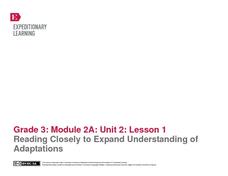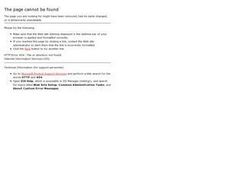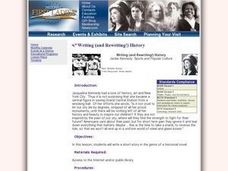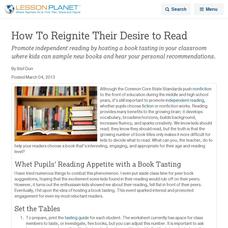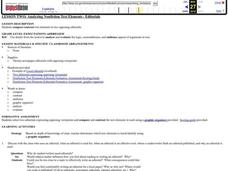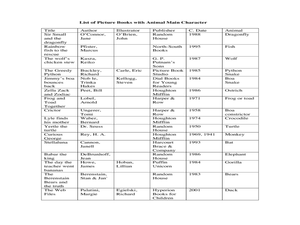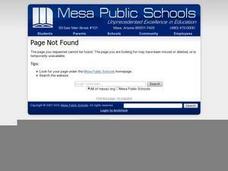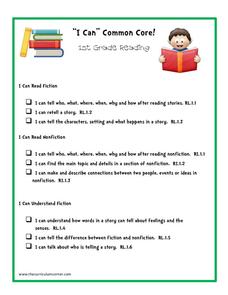EngageNY
Reading Closely to Expand Understanding of Adaptations
Third graders work to determine the main idea, recall key details, and answer questions using an informational text on the topic of animal adaptations. Using the non-fiction text "Staying Alive: Animal Adaptations" (provided) the teacher...
Curated OER
Analyzing Short Biographies to Discover Characteristics of Biographical Writing
Students read short biographies on Abraham Lincoln from various artists. Using the texts, they identify the subject of the biography and discuss whether or not illustrations contribute to a biography. They research specific information...
Curated OER
Welcome To Your Library
As an overview of the positive things the library has to offer, this would be a helpful presentation. However, it does not provide much information. This presentation could be augmented by adding details about the Dewey Decimal system or...
Curated OER
Non-Fiction Animal Picture Books
Students complete a multi-lesson plan unit using research to create their own book about an animal of their choice. After discussing the elements of non-fiction texts, they use internet research to explore an animal of interest to them....
Curated OER
The Numbers in Nonfiction
This library media PowerPoint introduces the system of nonfiction call numbers. Each slide includes information on what numbers go with each subject, along with colorful illustrations.
Curated OER
Nonfiction Book Report
For this Language Arts worksheet, students complete a chart and answer six questions about a nonfiction book. For example, students list three facts they found out from the book.
Curated OER
Real and Fictional Wolves
Students demonstrate understanding of the difference between real and fictional wolves through critical reading and comparisons while using a Venn Diagram.
National First Ladies' Library
Writing (and Rewriting!) History
Middle schoolers differentiate between fiction and non-fiction, discuss historical fiction, which combines both genres, choose historical novel from list and read independently, and write original short stories that combine elements of...
Learning Station
Scan It
In this reading strategies worksheet, students will learn how to scan for information. Then students will scan a non-fiction passage about weather and complete 4 short answer questions.
Curated OER
Animal Reports (Lesson 6 - Use of Information
Fourth graders use the computer catalog to find and select a nonfiction book to gather bibliographic information on an animal they have previously selected. They write the information on a note card.
PBS
Reading Adventure Pack: Green Eggs and Ham
A reading of Green Eggs and Ham by Dr. Seuss and a nonfiction book of your choice begins a reading adventure pack comprised of three hands-on activities. Following the reading, scholars craft a food mobile made of colorful fruit and...
Curated OER
How To Reignite Their Desire to Read
Promote independent reading by hosting a book tasting in your classroom where kids can sample new books and hear your personal recommendations.
Teaching Tolerance
Community Newsletter
What does it take to develop and publish a newsletter? Young academics create a newsletter with original artwork for their school or community. They explore social justice themes and spread messages of tolerance and inclusion. Scholars...
Curated OER
Analyzing Nonfiction Text Elements - Editorials
Students examine the text features of non-fiction. In this literacy lesson, students read editorial samples provided by their instructor and analyze the texts for word choice, details, and organization.
Curated OER
Natural Disasters: An Adventure in Non-Fiction
Learners study different natural disasters. In this natural disaster lesson students read a nonfiction book followed by a discussion, an experiment, then collect illustrations from their experience.
Curated OER
Find an Animal! Find a Book!
Learners identify the themes of different books by classifying their genre. In this genre lesson, students examine a specific animal by reading both a nonfiction and fiction book about the species. Learners compare the different books...
Curated OER
A House is a House for Me: Library Skills for Young Readers
Read Mary Ann Hoberman's book A House is a House for Me to introduce the idea that a library is a house for shelves of books. Young readers practice alphabetizing in the picture book (easy fiction) section of the library. They learn how...
Curated OER
School-Home Links: Fiction
For this fiction book worksheet, students read a book that is about make-believe people or animals and their lives. Students then write three things about the story that are make-believe. Parents or guardians must sign the worksheet.
Curated OER
Sound Devices in Poetry, Fiction and Nonfiction
Students examine the impact of sound devices in poetry. In this poetry lesson, students read the listed poems and identify uses of alliteration, repetition, consonance, rhythm, rhyme, and slang. Students discuss how sound devices enhance...
Curated OER
Reading Non-Fiction
Students identify the key features of printed non-fiction texts. In this deciphering texts instructional activity, students watch a video clip of a news program and a children's program to compare presentations. Students also identify...
Curated OER
Differences Between Fiction And Non-Fiction in the Library
Young scholars examine the differences between fiction and non-fiction books in the library by discussing kangaroos. They distinguish between facts about kangaroos, and using their imaginations and imagining what they would do with pet...
Curated OER
Historical Fiction - Based on facts or purely fiction?
Young scholars, after reading an Accelerated Reader historical fiction book, research the actual historical time period portrayed in the book. Then, working in a cooperative learning group, they create a HyperStudio presentation.
Curriculum Corner
"I Can" Common Core! 1st Grade Reading
This series of printable I can statements breaks down first grade Common Core reading standards into child-friendly terms. A great resource for providing clear learning objectives for young readers.
Curated OER
Butterfly, Butterfly: Teaching Vocabulary
Kindergarteners practice new words through listening to and reading the science book Butterfly by Jenny Feely. The teacher will first choose words that are essential for understanding the text. Then, using pictures in the text, pupils...
Other popular searches
- Genre Fiction and Nonfiction
- Fiction and Nonfiction Text
- Nonfiction and Fiction
- Fiction Nonfiction Books
- Fiction and Nonfiction Events
- Fiction vs Nonfiction Books
- Nonfiction Fiction
- Twinning Fiction/nonfiction
- Fiction or Nonfiction Unit
- Fiction vs. Nonfiction Books
- Fiction/nonfiction Books
- Identify Fiction Nonfiction


